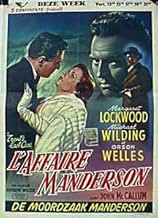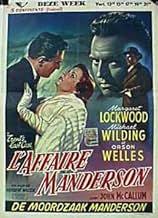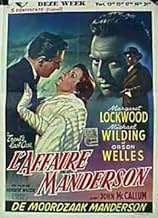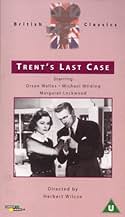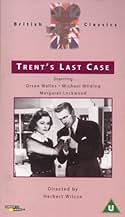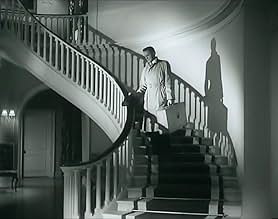AVALIAÇÃO DA IMDb
6,0/10
643
SUA AVALIAÇÃO
Adicionar um enredo no seu idiomaA reporter investigates a rich businessman's death. While police rule it suicide, Trent believes it's murder and grows intrigued by the widow and secretary.A reporter investigates a rich businessman's death. While police rule it suicide, Trent believes it's murder and grows intrigued by the widow and secretary.A reporter investigates a rich businessman's death. While police rule it suicide, Trent believes it's murder and grows intrigued by the widow and secretary.
- Direção
- Roteiristas
- Artistas
Geoffrey Bayldon
- Reporter in Court
- (não creditado)
Ernest Blyth
- Concert Attendee
- (não creditado)
Robert Cawdron
- Police Constable
- (não creditado)
John Chandos
- Tim O'Reilly
- (não creditado)
Anthony Collins
- Conductor
- (não creditado)
Henry Edwards
- Coroner
- (não creditado)
Eileen Joyce
- Pianist
- (não creditado)
Ben Williams
- Jimmy - Reporter
- (não creditado)
Kenneth Williams
- Horace Evans
- (não creditado)
- Direção
- Roteiristas
- Elenco e equipe completos
- Produção, bilheteria e muito mais no IMDbPro
Avaliações em destaque
This is pure whodunit,in the grand tradition of Agatha Christie and there are similarities with the lady of crime's "murder on the links" ,but the solution is not as brilliant as hers ,because in this field,she has no equal.
Anyway ,everyone who likes Christie will relish .A desirable mansion ,where a man took his own life (or was it murder?) and suspects including two secretaries,one of whom may be in love with the dead's wife and the other one may be jealous.But the main asset of the movie is the wealthy (suicidal?) businessman ,masterfully portrayed by Orson Welles whom we only see in flashbacks :the scene when we hear his formidable voice ,but only the back of his armchair gives the jitters. Michael Wilding has no gray cells,but he displays flair for clues ,as though he had be trained by Hercule Poirot.Entertaining whodunit.
Anyway ,everyone who likes Christie will relish .A desirable mansion ,where a man took his own life (or was it murder?) and suspects including two secretaries,one of whom may be in love with the dead's wife and the other one may be jealous.But the main asset of the movie is the wealthy (suicidal?) businessman ,masterfully portrayed by Orson Welles whom we only see in flashbacks :the scene when we hear his formidable voice ,but only the back of his armchair gives the jitters. Michael Wilding has no gray cells,but he displays flair for clues ,as though he had be trained by Hercule Poirot.Entertaining whodunit.
Surprisingly for me, this is a remake of a movie based on a novel written in 1913 or whereabouts. Surprisingly, because the plot is nothing special, a sort of opposite-gender "Leave her to Heaven", but a lot more lackluster.
Michael Wilding is the titular Trent, a bland and moderately charming artist-journalist (?) investigating the bizarre suicide of unpleasant billionaire Sigsbee (???) Manderson. What with the weird name? Anyway, after a coroner's verdict of suicide, Trent is intrigued by allegations of Manderson's wife having an affair with her husband's dashing secretary.
Lockwood plays the wife and she's the only substantial and charming presence in the movie. There is a lot of talk and only by the third act we get to see Orson Welles with bushy eyebrows and prosthetic nose as Sigsbee and he's indeed a malevolent character but also very grotesque, due to the ridiculous disguise.
After long explanations from all the players the movie ends on a happy, albeit forced, note.
Due to Welles appearing so late and to take advantage of the popularity of an earlier film, in Italy this was titled "The Third Man Returns", even if it has nothing to do with that masterpiece.
Michael Wilding is the titular Trent, a bland and moderately charming artist-journalist (?) investigating the bizarre suicide of unpleasant billionaire Sigsbee (???) Manderson. What with the weird name? Anyway, after a coroner's verdict of suicide, Trent is intrigued by allegations of Manderson's wife having an affair with her husband's dashing secretary.
Lockwood plays the wife and she's the only substantial and charming presence in the movie. There is a lot of talk and only by the third act we get to see Orson Welles with bushy eyebrows and prosthetic nose as Sigsbee and he's indeed a malevolent character but also very grotesque, due to the ridiculous disguise.
After long explanations from all the players the movie ends on a happy, albeit forced, note.
Due to Welles appearing so late and to take advantage of the popularity of an earlier film, in Italy this was titled "The Third Man Returns", even if it has nothing to do with that masterpiece.
This viewer is not exactly a devotee of the films of Herbert Wilcox but this one is not at all bad. E. C. Bentley had intended his novel to be a parody and although Wilcox has chosen to play it straight one cannot actually take it too seriously. This director's notable lack of flamboyance happens to suit this rather innocuous, teddibly civilised period piece very well.
It is presented by Republic Pictures for whom Orson Welles had made his bizarre 'Macbeth.' One is intrigued by his third billing and eagerly awaits his appearance. It is certainly worth the wait as his Mephistophelian presence and basso profundo are absolutely magnetic. It seems as if we are suddenly in an entirely different film and one is hardly surprised to learn that Welles wrote and directed his own scenes!
As for the rest of the film we have the debonair Michael Wilding, certainly no stranger to Wilcox, who is well cast as Bentley's engaging amateur sleuth of the title. Playing the widow of the millionaire who is assumed to have committed suicide, although Trent suspects foul play, is Margaret Lockwood. It is far more difficult to play 'good' than 'bad' and Miss Lockwood is more effective when playing the latter. The same comment would also apply to John McCallum as the prime suspect. The delightful Miles Malleson is, well.....Miles Malleson!
There is splendid use made of the Larghetto from Mozart's C minor piano concerto which suits the melancholy mood of the film.
By far the best scene(surprise, surprise) is one directed and wonderfully lit by Welles in which he and John McCallum discuss Shakespeare's depiction of a husband's jealousy in 'Othello'. Welles remarks that he had recently seen this play performed at St. James's Theatre and was none too keen on the leading actor. He is of course referring to, yes, you've guessed it........ himself!
It is presented by Republic Pictures for whom Orson Welles had made his bizarre 'Macbeth.' One is intrigued by his third billing and eagerly awaits his appearance. It is certainly worth the wait as his Mephistophelian presence and basso profundo are absolutely magnetic. It seems as if we are suddenly in an entirely different film and one is hardly surprised to learn that Welles wrote and directed his own scenes!
As for the rest of the film we have the debonair Michael Wilding, certainly no stranger to Wilcox, who is well cast as Bentley's engaging amateur sleuth of the title. Playing the widow of the millionaire who is assumed to have committed suicide, although Trent suspects foul play, is Margaret Lockwood. It is far more difficult to play 'good' than 'bad' and Miss Lockwood is more effective when playing the latter. The same comment would also apply to John McCallum as the prime suspect. The delightful Miles Malleson is, well.....Miles Malleson!
There is splendid use made of the Larghetto from Mozart's C minor piano concerto which suits the melancholy mood of the film.
By far the best scene(surprise, surprise) is one directed and wonderfully lit by Welles in which he and John McCallum discuss Shakespeare's depiction of a husband's jealousy in 'Othello'. Welles remarks that he had recently seen this play performed at St. James's Theatre and was none too keen on the leading actor. He is of course referring to, yes, you've guessed it........ himself!
It's good news for Welles completists that this, the better of the two films he made for Herbert Wilcox in 1952 (to help finance his on-off-on but finally magnificent film of 'Othello') is now available on DVD, though dismally free of extras. As a thriller it is a puzzle almost devoid of suspense, though there are some clever twists at the end. There are polished performances by Margaret Lockwood, John McCallum, Michael Wilding as the classy sleuth Trent, Miles Malleson in one of his best roles and Welles. Welles appears for no more than 20 minutes, in flashback, but, with his formidable false nose, is an intimidating presence as the late Sigsbee Manderson. In a fraught dialogue with McCallum he talks about 'Othello' and the production he's recently seen: "Didn't like the leading actor!" The leading actor was Welles himself, performing at the St James' theatre - a performance I was privileged have seen a year or two earlier, when Ken Tynan, long before PC was thought of, headed his review 'Citizen Coon'!
Unlike the other reviewers above, I enjoyed this film immensely, probably because I am a Margaret Lockwood fan and collect as many of her films as I can when they are available.This one is not commercially available but I managed to find a dealer on Ebay who specialises in the older films I like.The other reviewers mention it is too "talky" but this is not supposed to be "Die Hard" or even a James Bond adventure.It is a cultured British film, from Republic films, from 1952 with an excellent cast who speak with wonderful diction and enunciation before "kitchen sink drama" mesmerised film producers.Herbert Wilcox (Anna Neagle's husband) produced this gripping thriller that keeps you guessing right up to the very end.I will concede that the plot is at times a bit like an amateur dramatic society but this gives it its intrinsic charm especially when the principal parts are played by good professional actors.An example is Orson Wells sitting in an armchair and filmed from the rear redolent of a James Bond villain.He only needed to be stroking a white cat on his lap!! Michael Wilding plays his usual debonair self as "Philip Trent" the artistic crime reporter.Margaret Lockwood plays again the pianoforte (see my critique of "Love Story" (1944) when she played Lissa Campbell),This time we have the pleasure of listening to Eileen Joyce (the real pianist) playing the famous Mozart piano concerto no:24 in C minor, larghetto movement.Eileen's other famous film credit was playing the Rachmaninov 2nd piano concerto in C minor for "Brief Encounter (1945).Orson as mentioned was fond of Shakespeare's "Othello" and some of this plot is worked into this film.Like "The Third Man" (1949), Orson does not appear until late into the film but he immediately makes his not inconsiderable presence felt as "Sigsbee Manderson".Margaret plays Margaret Manderson his wife.No trouble remembering her name by the cast!John McCallum gives a workmanlike performance as John Marlowe, the secretary to Manderson and Miles Malleson for once leaves aside his clerical garb to play Burton Cupples, Margaret's uncle.What amused me was seeing a very young Kenneth Williams playing a garrulous Welsh gardener! You would only see this film if you you actively set out to acquire it since it never appears on the the TV and as I said is not commercially available.Obviously being a thriller I will not divulge the plot.Suffice to say it ends happily for all concerned.I rated it 8/10. Since I wrote this critique in July 2007 this title is now commercially available from www.silversirens.co.uk Enjoy!
Você sabia?
- CuriosidadesIn the film, Sigsbee Manderson (played by Orson Welles) mentions a performance of Shakespeare's "Othello" at the St. James Theatre in London in 1951, in which he disliked the leading actor's performance. This is an in-joke: Welles himself played Othello at the St. James in 1951, under his own direction. Peter Finch played Iago opposite him.
- Erros de gravaçãoDuring the coroners inquest, Trent was seen drawing a sketch of Marlowe. This is not allowed in English Courts. Although court artists are allowed in as members of the public, all drawings must be done by memory outside the courtroom.
- Citações
Margaret Manderson: He talks of reopening the case.
John Marlowe: You should've ordered him out of the house.
Margaret Manderson: And confirm his suspicions?
- Trilhas sonorasPiano Concerto in C Minor
Music by Wolfgang Amadeus Mozart (as Mozart)
Arranged and Conducted by Anthony Collins (uncredited)
Performed by Eileen Joyce
Principais escolhas
Faça login para avaliar e ver a lista de recomendações personalizadas
Detalhes
- Tempo de duração
- 1 h 30 min(90 min)
- Cor
- Proporção
- 1.37 : 1
Contribua para esta página
Sugerir uma alteração ou adicionar conteúdo ausente

